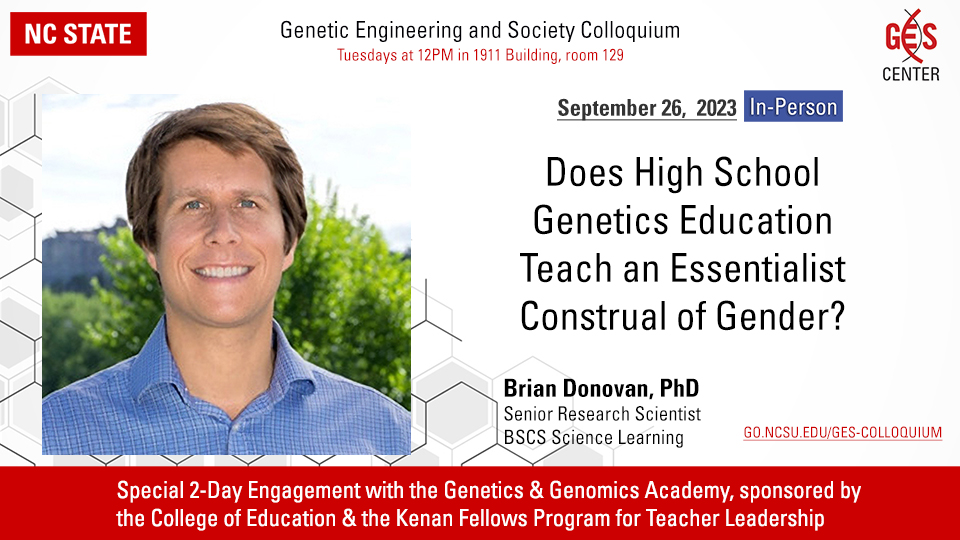
- This event has passed.
Brian Donovan—Does High School Genetics Education Communicate an Essentialist Construal of Gender? | GES Colloquium

Colloquium Home | Zoom Registration | GES Video Library (current) | Video Archives | Podcast | @GESCenterNCSU | Newsletter
Does High School Genetics Education Communicate an Essentialist Construal of Gender?
Brian Donovan, PhD, Senior Research Scientist, BSCS Science Learning 
Profile | Website | Related GGA Seminar
Evidence suggests that high school biology textbooks in the US may reinforce an essentialist construal of gender.
Download seminar poster
Special two-day engagement with the Genetics & Genomics Academy, sponsored by the College of Education and the Kenan Fellows Program for Teacher Leadership
Related GGA Seminar: Genetics Education Needs to Move Beyond Mendel to Combat White Supremacy, Monday, 9/25 @ 1:30 PM, Stephens Room (3503 Thomas Hall) & on Zoom
Abstract
Essentialism is the lay assumption that categories of living things have underlying, unobservable “essences.” When applied to gender, this assumption has a range of negative consequences, including stereotyping and discrimination. In this talk, Dr. Brian Donovan will present evidence from a content analysis and a randomized control trial to suggest that high school biology textbooks in the US communicate an essentialist construal of sex and gender to students and that students grow in their gender essentialist thinking after reading such texts. Dr. Donovan will argue that rather than conveying accurate knowledge about the biological and social complexity of sex and gender, biology education in the US seems to instead promote messages consistent with gender essentialism.
Related links:
- Humane Genetics, BCBS Science Learning
- Donovan, B. M., Weindling, M., Lee, D. (2020). From Basic to Humane Genomics Literacy: How Different Types of Genetics Curricula Could Influence Anti-Essentialist Understandings of Race. Science & Education. PDF
Speaker Bio
Brian M. Donovan is a senior research scientist at BSCS Science Learning, which is the oldest science education organization in the United States. He holds a B.A. in biology from Colorado College, a M.A. in teaching from the University of San Francisco, and a M.S. in biology and Ph.D. in science education from Stanford University. His research explores how genetics education interacts with social-cognitive biases to influence how students make sense of complex biological and social phenomena. By translating this research into frameworks that inform curriculum, instruction, and teacher education, Brian hopes to create a generation of researchers, teachers, and curriculum writers who know how to teach about human difference in a more humane manner. Brian’s award-winning educational research (e.g, The 2020 National Association for Research in Science Teaching (NARST) Early Career Research Award, The 2017 & 2022 Research Worth Reading Awards from NARST) has been reported on in the United States (e.g., The New York Times, The Atlantic/Undark, & EdWeek) and abroad (e.g., BBC Radio, The Independent, & The Australian Broadcasting System). Currently, he is the principal investigator of four different NSF-funded research projects that explore the cognitive, social, and educational factors that link the learning of human genetics to reductions in racism, sexism, and deterministic worldviews that limit human potential. Before his research career in science education, Brian taught middle school science for seven years in San Francisco.
GES Colloquium is jointly taught by Drs. Jen Baltzegar and Dawn Rodriguez-Ward, who you may contact with any class-specific questions. Colloquium will be held in person in the 1911 Building, room 129, and live-streamed via Zoom.
Please subscribe to the GES newsletter and Twitter for updates.
WordPress database error: [Unknown column 'wp_tec_occurrences.start_date' in 'SELECT']SELECT SQL_CALC_FOUND_ROWS wp_posts.*, CAST( wp_tec_occurrences.start_date AS DATETIME ) AS event_date
FROM wp_posts LEFT JOIN wp_term_relationships ON (wp_posts.ID = wp_term_relationships.object_id) LEFT JOIN wp_postmeta ON ( wp_posts.ID = wp_postmeta.post_id AND wp_postmeta.meta_key = '_EventHideFromUpcoming' ) LEFT JOIN wp_postmeta AS mt1 ON ( wp_posts.ID = mt1.post_id )
WHERE 1=1 AND wp_posts.ID NOT IN (19242) AND (
wp_term_relationships.term_taxonomy_id IN (149,521,802)
OR
wp_term_relationships.term_taxonomy_id IN (45,47)
) AND (
wp_postmeta.post_id IS NULL
AND
( mt1.meta_key = '_EventStartDate' AND CAST(mt1.meta_value AS DATETIME) >= '2026-02-26 08:30:23' )
) AND wp_posts.post_type IN ('post', 'page', 'attachment', 'tribe_venue', 'tribe_events', 'tribe_event_series') AND ((wp_posts.post_status = 'publish'))
GROUP BY wp_tec_occurrences.occurrence_id
ORDER BY event_date ASC, wp_posts.post_date ASC
LIMIT 0, 3